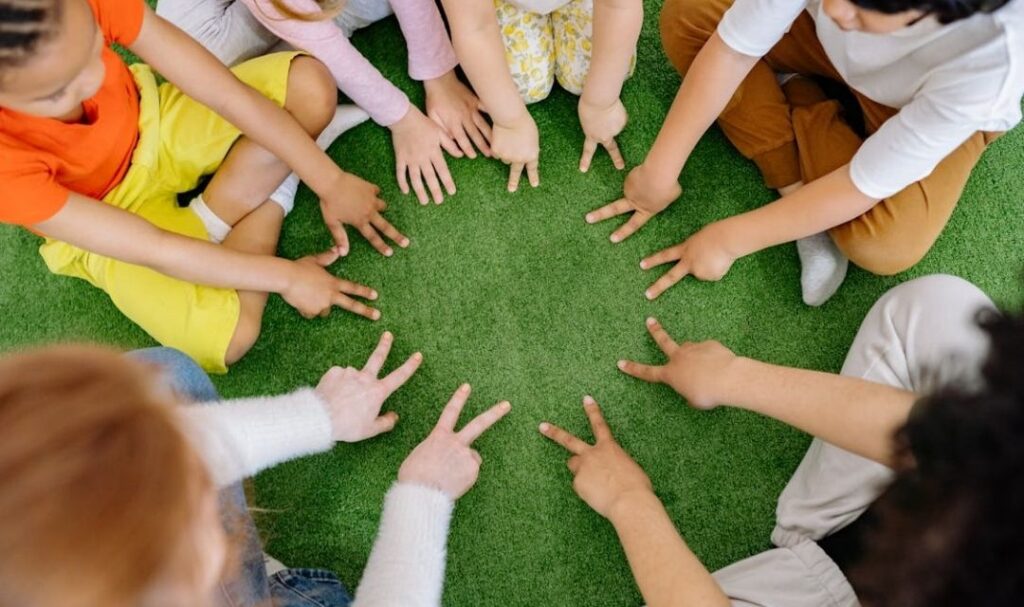As a parent, it’s your responsibility to help your child develop social skills. Good social skills make your child show up confidently in social settings and hence, opening different opportunities.
In this article, we will share 10 tips to develop social skills in your child.
1. Teach empathy
Empathy means understanding another person. If children can understand the other person and share their feelings, they are much more likely to create positive connections with others.
As a parent, you can help your child develop empathy by teaching them to see emotions from the other person’s perspective. While you teach them to understand the other, help them express their emotions too.
Part of showing empathy is to be an active listener. It’s more about understanding than speaking.
2. Know your child

Naturally, some children are very extroverted and social than others. It’s better not to push a shy and introverted kid in large group settings as they may become uncomfortable. To avoid doing so, learn about your child’s social limits.
You can encourage your introverted child to make friends with other kids who share same hobbies as them. However, if your child needs some ‘me-time’ after an hour or two, let them be.
Give your child the space that they need to recharge themselves. It will help them develop healthy social skills without feeling drained.
3. Start with questions
Asking questions is a great way to initiate a conversation and learn more about the other person. Sometimes, children get nervous in social situations and may struggle to form conversations with other children.
To overcome this, teach your child to ask questions that don’t end with a ‘yes or no’ as an answer. For example, a question like “I like how you did this. How did you learn to perform this task?”
Help them initiate conversations with questions, or maybe, make them join a group that aligns with their hobbies — like a musical.
4. Tell, “Sharing is good”

Sharing toys, crayons, and other things are a good way to form empathy and compassion in children. It also teaches them how sharing is a form of cooperation.
You can start with encouraging them to share their things with you and other people at home. When they do share with their friends, be sure to praise them.
However, at the same time, it’s essential to teach them to not overshare and form healthy boundaries with friends. Otherwise, they may end up forming a tendency to please people to form new friends.
Also read: How to Make Your Child Mentally and Emotionally Strong?
5. Encourage them to engage

One of the best ways to help your child develop social skills is to encourage them to make new friends. You can start with providing them enough opportunities to engage with other children. For example, your child can join an art class or so to make friends with similar hobbies.
6. Resolve the conflicts
Children often fight with each over little things which can lead to conflicts. Now, the way they react to it depends on how you teach them to deal with conflicts.
Teach them to resolve conflicts in a positive and calm manner. Help them resolve conflicts with skills such as active listening, compromise, and positivity.
Additionally, be a good example for your child to learn from. When you have a conflict with someone, deal with them calmly. Show your child exactly what you want them to be.
7. Be your child’s role model
Lastly, children learn from what they see around, especially their parents. So, it’s important to observe how you interact with others in front of your child.
Show empathy around people. Stay calm in social settings and respond to people thoughtfully. Listen to your friend actively when they are sharing something. Make them feel heard and most importantly, make your child feel heard and important.
Remember that your child is always watching and learning from you. Being their effective role model means putting a conscious thought in social settings.
8. Teach The Basics

Children are often unaware of basic manners of having a conversation, such as saying “please” or “thank you”. So, you can explain to your kid how it’s important to say the common forms of courtesy.
Make it a rule at your home to say “please” when asking for something and “thank you” when receiving something. This will help your child learn positive manners.
9. Be a Good Instructor
Children who struggle to follow instructions given by their teachers or parents may face consequences in their academics and social skills. When you instruct your child to finish their homework by 6 PM, it’s important for them to follow your directions.
However, before you expect anything from them, it all starts with you. You have to be a well-versed instructor with practices such as: Giving one instruction at a time and being gentle. In addition, remember that mistakes are normal. When your kid finishes a task, you can say “thank you” to them.
10. Personal Space
Some kids like to be close with other people. However, it’s important for you to teach them to respect other people’s personal space. To do so, you can create rules at home such as — “Knock on closed doors” and “Keep your hands to yourself”.
You can also teach your kid to not touch others’ stuff before taking permission. If your little one interferes someone’s personal space, gently tell them the right thing to do. While teaching them, ensure that you’re doing so within their personal comfort.
Another great idea would be to act as your child’s friend to teach them distance. As they get older, you can tell them about the concept of creating boundaries — for themselves and others.
Conclusion
While you may think that children will develop social skills by themselves in time, it surely takes your part to raise a confident child. More essentially, developing social skills takes time in children.
They learn slow, but their childhood’s foundation makes up for how they well they will do in future.



